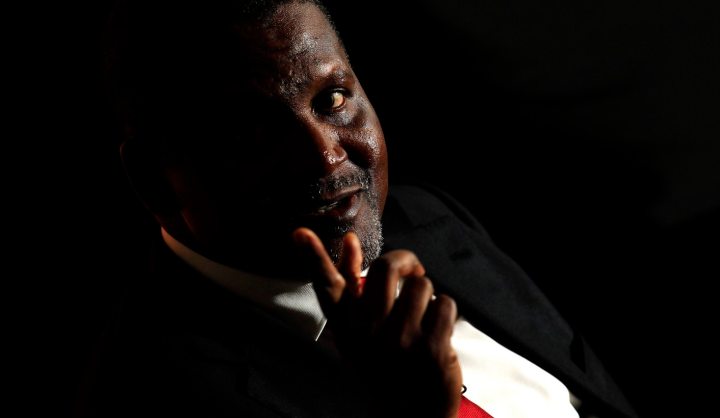Africa
Can Africa’s richest man save Zimbabwe’s economy?

Aliko Dangote’s cement empire is only getting bigger, with Zimbabwe next in the Nigerian tycoon’s sights. But this might be more than just a canny business decision: if Mugabe’s government is right, this could be the intervention that finally turns Zimbabwe’s economy around. But that’s a big if. By SIMON ALLISON.
Zimbabwe is not an obvious investment destination. Between its faltering economy, unpredictable indigenisation campaigns and the continued degradation of its industrial capacity, the country is an unappealing prospect for most investors.
Aliko Dangote, however, is not most investors. He is Africa’s richest man, by some distance (worth $16.5 billion and counting), and he made his initial fortune in Nigeria – another difficult, unstable market. He’s now pouring this money into an aggressive African investment campaign, one which has seen him build cement plants all over the continent, including in Cameroon, Ethiopia, Republic of Congo, Liberia, Senegal, South Africa, Tanzania, Kenya and Zambia.
Now Dangote is planning on taking his business to Zimbabwe – even though Zimbabwe’s GDP ($13.7 billion) is worth less than Dangote’s personal fortune.
It’s a gamble, but few would bet against him succeeding. “Modest in nature but ruthless in his business dealings, Mr Dangote’s bets on Nigeria, and the wider region, have paid off spectacularly…They have also made him the champion of homegrown investment in Africa, and given him a headstart on multinationals wary of the difficulties and risks on investing on the continent,” said the Financial Times.
In early September, Dangote arrived in Zimbabwe on his private jet for meetings with President Robert Mugabe and vice-presidents Emmerson Mnangagwa and Phelekezela Mphoko, as well as several cabinet ministers. He left the same day with lucrative deals to set up a cement plant, a coal mine and a power station. The value of the cement plant alone is estimated at $400 million, with the total investment thought to top $1 billion.
Crucially, according the Zimbabwean Independent, Dangote also secured an exemption from Zimbabwe’s controversial indigenisation policy, which requires investors to hand over a 51% shareholding to “indigenous Zimbabweans”. An investment licence from the Zimbabwean Investment Authority, usually difficult to obtain, followed in October.
For Mugabe’s government, struggling to reverse an economic malaise, Dangote’s interest is seen as a game-changer. “While investors from the West see an adverse and hopeless situation in Zimbabwe, Mr Dangote has seen an investment opportunity that will undoubtedly bring grist to his mill,” said the state-controlled Zimbabwe Broadcasting Corporation. “That investment potential has inspired the business magnate to consider investing billions of dollars in Zimbabwe’s key economic areas of mining, energy and cement production. The investments will go a long way in resurrecting the economy that was ravaged by the illegal sanctions imposed by the West at the behest of the (opposition) MDC (Movement for Democratic Change) party.”
Although Zimbabwe’s economy enjoyed rapid growth between 2009 and 2012 following the introduction of the multiple currency system, this growth has slowed dramatically, from over 10% to well under 4%. This is largely thanks to a slump in the mining sector. Even more worrying, according to the African Development Bank, is that the country is failing to use its existing industrial capacity (never mind create more): “Industrial capacity utilisation continues to decline, and is estimated at 36.3% owing to underproduction and lack of competitiveness,” said the bank.
Mugabe’s critics have said that, given the scale of Zimbabwe’s problems, Dangote’s investment will not be the panacea that the government is hoping for. “There was euphoria within [the ruling party] about the issue of Dangote investment. They almost gave [Dangote] many wives,” said main opposition leader Morgan Tsvangirai. But Tsvangirai said this euphoria is misplaced: “This country does not need $400 million but $15 billion to implement an actual economic turnaround programme. Yes, if Dangote wants to bring his little monies to invest let him come but the truth of the matter is that the country’s economy cannot be rescued as long as Mugabe maintains his grip on power.”
Blessing Vava, a political commentator, said that this is not the first time that the Zimbabwean government had trumpeted major new investment deals, pointing to high-profile deals with the Chinese and Russian governments that have yet to materialise. “Have we become so desperate as to pin our hopes of economic recovery on one wealthy businessman? The truth is that Zanu PF wants to act as if they are doing something about the ailing economy…Most Zimbabweans will never be enticed by this cheap politicking. These are just desperate attempts by government and we know that most so-called deals remain a pipe dream. We can justifiably remain sceptical about all these deals because they have failed to bring food on the table of many Zimbabweans,” said Vava. DM
Read more:
- Secrets and intrigues of Dangote’s trip to Zimbabwe — worth more than its GDP, he came away with big deals in the Zimbabwe Independent
Photo: Founder and Chief Executive of the Dangote Group Aliko Dangote speaks at a Thomson Reuters newsmaker conference in London November 23, 2010. REUTERS/Luke MacGregor.
















 Become an Insider
Become an Insider